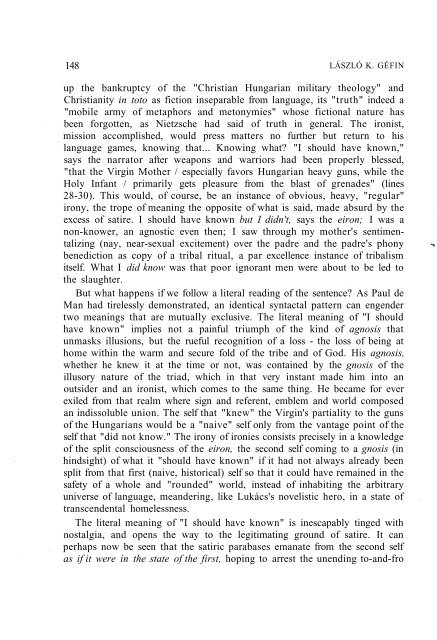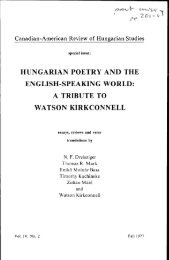148 LÁSZLÓ K. GÉFINup the bankruptcy of the "Christian Hungarian military theology" andChristianity in toto as fiction inseparable from language, its "truth" indeed a"mobile army of metaphors and metonymies" whose fictional nature hasbeen forgotten, as Nietzsche had said of truth in general. The ironist,mission accomplished, would press matters no further but return to hislanguage games, knowing that... Knowing what? "I should have known,"says the narrator after weapons and warriors had been properly blessed,"that the Virgin Mother / especially favors Hungarian heavy guns, while theHoly Infant / primarily gets pleasure from the blast of grenades" (lines28-30). This would, of course, be an instance of obvious, heavy, "regular"irony, the trope of meaning the opposite of what is said, made absurd by theexcess of satire. I should have known but I didn't, says the eiron; I was anon-knower, an agnostic even then; I saw through my mother's sentimentalizing(nay, near-sexual excitement) over the padre and the padre's phonybenediction as copy of a tribal ritual, a par excellence instance of tribalismitself. What I did know was that poor ignorant men were about to be led tothe slaughter.But what happens if we follow a literal reading of the sentence? As Paul deMan had tirelessly demonstrated, an identical syntactal pattern can engendertwo meanings that are mutually exclusive. The literal meaning of "I shouldhave known" implies not a painful triumph of the kind of agnosis thatunmasks illusions, but the rueful recognition of a loss - the loss of being athome within the warm and secure fold of the tribe and of God. His agnosis,whether he knew it at the time or not, was contained by the gnosis of theillusory nature of the triad, which in that very instant made him into anoutsider and an ironist, which comes to the same thing. He became for everexiled from that realm where sign and referent, emblem and world composedan indissoluble union. The self that "knew" the Virgin's partiality to the gunsof the Hungarians would be a "naive" self only from the vantage point of theself that "did not know." The irony of ironies consists precisely in a knowledgeof the split consciousness of the eiron, the second self coming to a gnosis (inhindsight) of what it "should have known" if it had not always already beensplit from that first (naive, historical) self so that it could have remained in thesafety of a whole and "rounded" world, instead of inhabiting the arbitraryuniverse of language, meandering, like Lukács's novelistic hero, in a state oftranscendental homelessness.The literal meaning of "I should have known" is inescapably tinged withnostalgia, and opens the way to the legitimating ground of satire. It canperhaps now be seen that the satiric parabases emanate from the second selfas if it were in the state of the first, hoping to arrest the unending to-and-fro
THE AGON OF IRONY AND SATIRE 149movement of ironic play. (Despite appearances, the agon of irony and satire isnot a replay of the conflict of the "unhappy consciousness"; for one, languageplays no role in Hegel's scheme; for another, there is no Geist in sight tounderwrite the struggle.) The appeal of the de-ironized voice is primarily toJesus, "standing," as it were, untouched behind the havoc of Christiancenturies, whose "presence" calls forth the satirist's ire:A Te szentségeddela Te uraságoddala Te testetlen trónoddalnincs nekem bánatom,nincsen lázongásom.Csak a rikoltozóhőkölő pózolófüstölőlengetődíszdicsőítőkkel, satb.[With your holinesswith your dominationwith your ethereal throneI have no quarrelI have no disputeOnly with the shriekingclamoring posturingcenser-wieldingglory-glorifiers, etc.]The emblems of illusion, the armies of mendacious metaphors wielded byChristians appear to cover up the "real" Jesus, making the road to hisunsullied presence near impenetrable. But he is "really" there; and if we ask,just exactly where there is, the narrator provides unambiguous answer. Jesusis to be known from the "deepest, most secret core of our heart" ("szívünklegtitkosabb zugából" [20]). Are we back with Pascal, and the heart's reasonswhich reason knows nothing about? Possibly; although the narrator alludesmore often to the behavior and psychology of the historical Jesus rather thanto his "ethereal throne," and also to those who resemble Jesus in their activelife as distinct from the glorifiers and hypocrites. In the Gloria, after CumSancto Spiritu in gloria Dei Patris, Amen, comes this series of rapid juxtapositions:-Sz. Sz. atya pofoz, hajat húzdicsőség-térdeltet-Jézus nem pofozottőtütötték-nem térdeltetett-tcrdelt-mégis,az Atyaúristen dicsőségében-Szént Ferenc nem húztaa gyermekek haját-az állatok is kezére simultak [24][-Father Sz. Sz. slaps face, pulls hairmakesone kneel for glory-Jesus slapped no onethey beat him-made no one kneel-he knelt—still,in the glory of God the Father-St. Francis didn't pullchildren's hair-his hand tamed even animals].The behavior of Jesus (and St. Francis) is thus an example set for humansto imitate. One should begin by not beating up on children; but since the
- Page 1 and 2:
Papers of the Radnóti Memorial Con
- Page 3:
HUNGARIAN STUDIESVOLUME 11, 1996 CO
- Page 8 and 9:
6 GEORGE GÖMÖRIprobably Fürst an
- Page 10 and 11:
8 GEORGE GÖMÖRIof the utmost impo
- Page 12 and 13:
10 GEORGE GÖMÖRIén e földön...
- Page 14 and 15:
12 GEORGE GÖMÖRINotes1. Miklós R
- Page 16 and 17:
14 MIHÁLY SZEGEDY-MASZÁKself alwa
- Page 18 and 19:
16 MIHÁLY SZEGEDY-MASZÁKtype is r
- Page 20 and 21:
18 MIHÁLY SZEGEDY-MASZÁKpose, the
- Page 22 and 23:
20 MIHÁLY SZEGEDY-MASZÁK"Wozu Dic
- Page 24 and 25:
22 MIHÁLY SZEGEDY-MASZÁKand Wilme
- Page 26 and 27:
24 MIHÁLY SZEGEDY-MASZÁKbeen the
- Page 28 and 29:
26 MIHÁLY SZEGEDY-MASZÁKBolond, k
- Page 30 and 31:
28 MIHÁLY SZEGEDY-MASZÁK6. Emery
- Page 32 and 33:
30 ZSUZSANNA OZSVÁTHand breaks as
- Page 34 and 35:
32 ZSUZSANNA OZSVÁTHThe drama echo
- Page 36:
34 ZSUZSANNA OZSVÁTHcontinents at
- Page 39 and 40:
FROM CAIN TO NAHUM 37which, as Csap
- Page 41 and 42:
\FROM CAIN TO NAHUM 39and bears and
- Page 43 and 44:
FROM CAIN TO NAHUM 41who sees what
- Page 45 and 46:
FROM CAIN TO NAHUM 438. "A félelme
- Page 47 and 48:
HELP ME, PASTORAL MUSE:THE VIRGELIA
- Page 49 and 50:
HELP ME, PASTORAL MUSE 47compete! W
- Page 51 and 52:
HELP ME, PASTORAL MUSE 49of a priva
- Page 53 and 54:
HELP ME, PASTORAL MUSE 51Once again
- Page 55 and 56:
HELP ME, PASTORAL MUSE 53Eighth Ecl
- Page 57 and 58:
HELP ME, PASTORAL MUSE 55have that
- Page 59:
HELP ME, PASTORAL MUSE 57Paul de Ma
- Page 62 and 63:
60 SAMUEL J. WILSONWe did, however,
- Page 64 and 65:
62 SAMUEL J. WILSONbeings and contr
- Page 66 and 67:
64 SAMUEL J. WILSONHungarians would
- Page 68 and 69:
66 SAMUEL J. WILSONthe Austrians. G
- Page 70 and 71:
68 SAMUEL J. WILSONnorth-eastern Zi
- Page 72 and 73:
70 SAMUEL J. WILSONoriginally pursu
- Page 74 and 75:
72 SAMUEL J. WILSONGörgey's decisi
- Page 76 and 77:
74 SAMUEL J. WILSONfrom occurring,
- Page 78 and 79:
76 SAMUEL J. WILSON8. Artúr Görge
- Page 80 and 81:
78 STEVEN TÖTÖSY de ZEPETNEKtört
- Page 82 and 83:
80 STEVEN TÖTÖSY de ZEPETNEKThe c
- Page 84 and 85:
82 STEVEN TÖTÖSY de ZEPETNEKher u
- Page 86 and 87:
84 STEVEN TÖTÖSY de ZEPETNEKthe b
- Page 88 and 89:
86 STEVEN TÖTÖSY de ZEPETNEKrooti
- Page 90 and 91:
88 STEVEN TÖTÖSY de ZEPETNEKcriti
- Page 92 and 93:
90 STEVEN TÖTÖSY de ZEPETNEK'My f
- Page 94 and 95:
92 STEVEN TÖTÖSY de ZEPETNEKshe d
- Page 96 and 97:
94 STEVEN TÖTÖSY de ZEPETNEKNotes
- Page 99 and 100: BERLIN ET PARIS DE LAJOS TIHANYIVAL
- Page 101 and 102: BERLIN ET PARIS DE LAJOS TIHANYI 99
- Page 103 and 104: BERLIN ET PARIS DE LAJOS TIHANYI 10
- Page 105 and 106: BERLIN ET PARIS DE LAJOS TIHANYI 10
- Page 107 and 108: BERLIN ET PARIS DE LAJOS TIHANYI 10
- Page 109 and 110: BERLIN ET PARIS DE LAJOS TIHANYI 10
- Page 111 and 112: BERLIN ET PARIS DE LAJOS TIHANYI 10
- Page 113 and 114: BERLIN ET PARIS DE LAJOS TIHANYI 11
- Page 115: BERLIN ET PARIS DE LAJOS TIHANYI 11
- Page 118 and 119: 116 KEVIN E. KELLYfilms Lugosi made
- Page 120 and 121: 118 KEVIN E. KELLYthe provinces, no
- Page 122 and 123: 120 KEVIN E. KELLYWith his brief an
- Page 124 and 125: 122 KEVIN E. KELLYboth his and Dean
- Page 126 and 127: 124 KEVIN E. KELLYfollowed it into
- Page 128 and 129: 126 KEVIN E. KELLYvampiric nobleman
- Page 130 and 131: 128 KEVIN E. KELLYThe film also boo
- Page 132 and 133: 130 KEVIN E. KELLYWood remained one
- Page 134 and 135: 132 KEVIN E. KELLYLugosi, convinced
- Page 136 and 137: 134 KEVIN E. KELLY19. Lennig, 112-1
- Page 139 and 140: THE AGON OF IRONY AND SATIREIN GYÖ
- Page 141 and 142: THE AGON OF IRONY AND SATIRE 139poe
- Page 143 and 144: THE AGON OF IRONY AND SATIRE 141tra
- Page 145 and 146: THE AGON OF IRONY AND SATIRE 143fek
- Page 147 and 148: THE AGON OF IRONY AND SATIRE 145ner
- Page 149: THE AGON OF IRONY AND SATIRE 147whi
- Page 153 and 154: THE AGON OF IRONY AND SATIRE 151for
- Page 155 and 156: THE AGON OF IRONY AND SATIREA harma
- Page 157 and 158: MURDER IN THE MOUNTAINSTranslated b
- Page 159 and 160: MURDER IN THE MOUNTAINS 157"Afraid?
- Page 161 and 162: MURDER IN THE MOUNTAINS 159Abády,
- Page 163 and 164: MURDER IN THE MOUNTAINS 161"The mar
- Page 165 and 166: MURDER IN THE MOUNTAINS 163Bálint
- Page 167 and 168: MURDER IN THE MOUNTAINS 165"That is
- Page 169 and 170: MURDER IN THE MOUNTAINS 167at hand,
- Page 171 and 172: CONTRIBUTORSMiklós BÁNFFYLászló
















